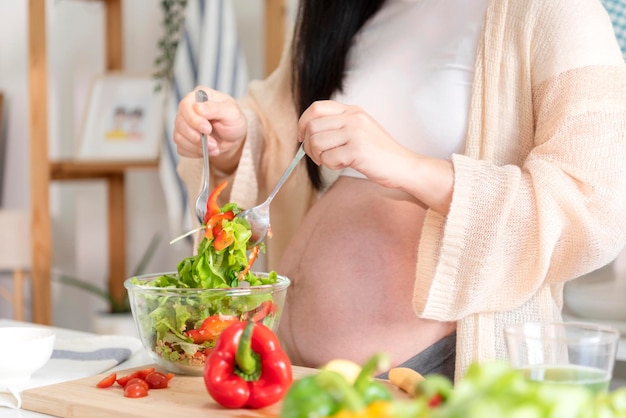
During pregnancy, a woman’s responsibility doubles as she needs to care for both herself and her growing baby. Everything she eats and drinks nourishes not only her body but also the baby developing inside her. That’s why it’s essential to understand the right pregnancy diet for a healthy child.
Expectant mothers should increase their food intake because the nourishment has to support two: one part for themselves and the other for their baby. This additional requirement helps the baby grow and develop in a healthy way. Doctors often recommend eating nutrient-rich foods during pregnancy. However, challenges like nausea and vomiting, especially during the first trimester, can make this difficult. Additionally, pregnancy can cause changes in taste, leading many women to avoid foods that are actually good for them. Despite these obstacles, a balanced and nutritious diet is crucial as it benefits both mom and baby.
Every type of food contains unique nutrients that contribute to different aspects of the baby’s growth and development. Since calorie intake increases during pregnancy, women naturally gain weight. It’s important not to skip meals or cut back on calories to avoid weight gain, as this could negatively affect the mother and baby’s health and make delivery more challenging. Instead, focus on eating nutrient-dense foods to manage weight healthily.
To ensure a smooth nine-month journey and prepare for the delivery of a healthy baby, it’s important to have a clear idea of what foods are beneficial. Here’s a list of nine top foods for a healthy pregnancy:
### 1. Sweet Potatoes
Sweet potatoes are packed with nutrients like potassium, Vitamin B6, Vitamin C, beta-carotene, copper, fiber, and iron. They strengthen the baby’s bones, support growth, and promote a healthy delivery. Beta-carotene, in particular, helps the body produce Vitamin A, which is essential for healthy skin, bones, and eyesight. Sweet potatoes are versatile and can be eaten boiled or mixed with milk. They also provide strength and prevent fatigue, helping moms-to-be manage the extra demands of pregnancy.
### 2. Beans
Beans are nutritional powerhouses, loaded with iron, protein, zinc, fiber, folate, and calcium. They nourish both the mother and baby and are especially helpful for non-meat eaters looking for plant-based protein alternatives. Zinc in beans reduces the risk of complications like preterm labor, low birth weight, and prolonged delivery. Adding beans to your meals can support a healthy pregnancy.
### 3. Eggs
Eggs are an excellent source of protein, crucial for the baby’s growth. They also provide iron, choline, and folate. Choline is particularly important for brain development and helps prevent brain-related birth defects. The yolk contains the highest concentration of choline, so it’s worth including in your meals. Eggs are affordable and can be prepared in various ways, like boiled, scrambled, or as an omelet, making them a satisfying and tasty addition to your diet.
### 4. Orange Juice
Orange juice is not only refreshing but also packed with Vitamin C, folate, and potassium. Drinking a glass every morning boosts energy, strengthens immunity, and supports the baby’s development. Vitamin C helps the body absorb iron, which is essential for building strong bones and teeth. Folate and potassium ensure healthy brain development and prevent fatigue. Including orange juice in your daily routine is a simple way to maintain your energy levels and health during pregnancy.
### 5. Lean Meat
Lean cuts of pork and beef are rich in protein, Vitamin B, and iron. Protein helps build your baby’s muscles, while iron supports bone development and improves red blood cell production, reducing the risk of anemia. Vitamin B6 in lean meat aids in tissue formation and brain development, while B12 helps with red blood cell production and a healthy nervous system. Adding lean meat to your diet supports both mom and baby’s growth.
### 6. Salmon
Salmon is a fantastic source of Omega-3 fatty acids (like EPA and DHA), which are essential for brain development in the baby. It’s also known to boost IQ levels and prevent neurological issues. With low mercury content, salmon is safe for pregnant women and supports eye health in the baby. However, it’s important to consume it in moderation and consult a doctor for recommended quantities.
### 7. Oats
Oats are a fiber-rich food that helps with digestion and prevents constipation, a common pregnancy symptom. They also contain Vitamin B6 and protein, which aid in muscle and tissue development. As a healthy and energizing breakfast option, oats prevent morning sickness and keep you feeling full and active throughout the day. Adding this nutrient-packed whole grain to your diet supports a smooth pregnancy.
### 8. Yogurt
Plain yogurt is an excellent source of calcium, essential for the baby’s bone growth and the mother’s overall health. It also contains Vitamin B, zinc, and protein, which promote the baby’s development and reduce the risk of preterm labor. Pregnant women need at least 1,000 mg of calcium daily, and yogurt is a delicious way to meet this requirement. Enjoy it on its own or mix it with fruits and smoothies for added benefits.
### 9. Green Leafy Vegetables
Leafy greens like spinach, kale, broccoli, and asparagus are rich in essential nutrients like calcium, iron, folate, potassium, fiber, and Vitamins A, C, and K. These vegetables also have antioxidant properties that strengthen the immune system and protect against illnesses. Including greens in your meals ensures healthy development for the baby and makes delivery smoother by preventing low weight or other complications.
All the foods mentioned here have been recommended by health experts and contribute to a healthy pregnancy and baby. Following this guide can help you navigate through your nine-month journey with confidence, ensuring that both you and your baby are well-nourished.